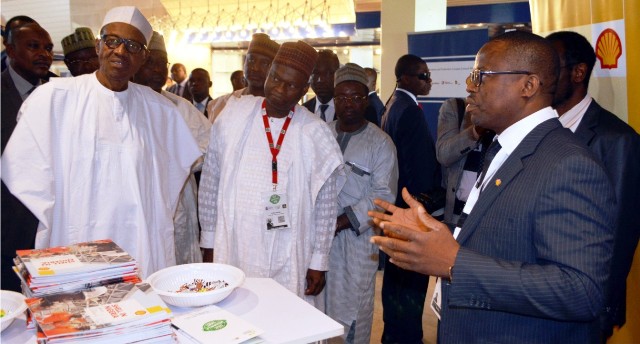Business
‘We Must Diversify To Boost Local Production’

President Muhammadu Buhari has reiterated the determination of his administration to diversify the economy to boost local production of goods and services.
The president stated this in Abuja on Monday at the opening of the 22nd Nigerian Economic Summit.
He said that with diversification of the economy, Nigeria would never again depend on one commodity to survive as a nation.
“As I have said in the past, we need to diversify the economy so that we will never again have to rely on one commodity to survive as a country so that we can produce the food we eat.
“We also have to make our own textiles work, produce most of the things we use and create the right environment for our young people to be able to innovate and create jobs through technology.
“This has been the commitment and the mandate of this administration and I have remained focused on it each day, since the assumption of this administration.
“There is clearly no better way to achieve this without building our economic foundation of made in Nigeria goods and services,’’ he added.
According to him, the theme of the summit: Made in Nigeria, lies at the heart of so many efforts his administration is making to lead the nation through “this trouble times and lay a firm foundation for the future”.
He noted that that the summit had champions of made in Nigeria that had defied the odds over the years to produce locally and contribute to the economy.
He said his administration would continue to encourage more local production of goods and services, adding that government’s greatest desire was to transform the economy from import dependence to an export-led economy in goods and services.
“My greatest desire is that Nigeria moves from import dependence to self sufficiency in local production and become an export-led economy in goods and services.
“I strongly believe that this summit will bring all stakeholders on board to stay on the course.”
The president expressed the hope that by the end of the summit, the participants would make useful and realistic recommendations and policies aimed at addressing the socio-economic challenges facing the country.
In his remarks, the Minister of Budget and National Planning, Mr Udoma Udo Udoma, assured that the government would continue to improve the enabling environment for businesses to thrive.
“We will continue, among other things, to prioritise our spending towards critical infrastructure to improve Nigerian competitiveness.
“Government agencies will work with the private sector to support research with a view to developing high quality indigenous products and technologies.’’
He explained that many of the government’s programmes had been structured to stimulate domestic production.
He cited the School Feeding Programme as an example, saying the programme would utilise only locally grown and produced food items.
He, however, stated that much more needed to be done by both the public sector and the private sector to encourage and support local production.
Udoma said that “the summit will provide an opportunity to examine what more can be done.
“How do we promote the consumption of more Made in Nigeria goods and services? How do we improve the quality of ‘Made in Nigeria’ goods to international standards so they can be exported?
“How can we support our SMEs to be able to compete?
“It is our expectation that this Summit will provide a platform to sharpen the focus of the conversation and also offer recommendations that will help reinvigorate our industries and services.
He said this would curtail the growing demand for foreign exchange for imported finished goods in the country.
Business
Fidelity Bank To Empower Women With Sustainable Entrepreneurship Skills, HAP2.0
Business
President Tinubu Approves Extension Ban On Raw Shea Nut Export
Business
Crisis Response: EU-project Delivers New Vet. Clinic To Katsina Govt.
-

 News2 days ago
News2 days agoAmend Constitution To Accommodate State Police, Tinubu Tells Senators
-

 Politics2 days ago
Politics2 days agoSenate Urges Tinubu To Sack CAC Boss
-

 News2 days ago
News2 days agoDisu Takes Over As New IGP …Declares Total War On Corruption, Impunity
-
Business2 days ago
President Tinubu Extends Raw Shea Nuts Export Ban To 2027
-
Business2 days ago
Crisis Response: EU-project Delivers New Vet. Clinic To Katsina Govt.
-
Business2 days ago
President Tinubu Approves Extension Ban On Raw Shea Nut Export
-
Rivers2 days ago
Etche Clan Urges Govt On Chieftaincy Recognition
-
Business2 days ago
FG Pushes Cassava Bioethanol Drive To Boost Industrial Growth

